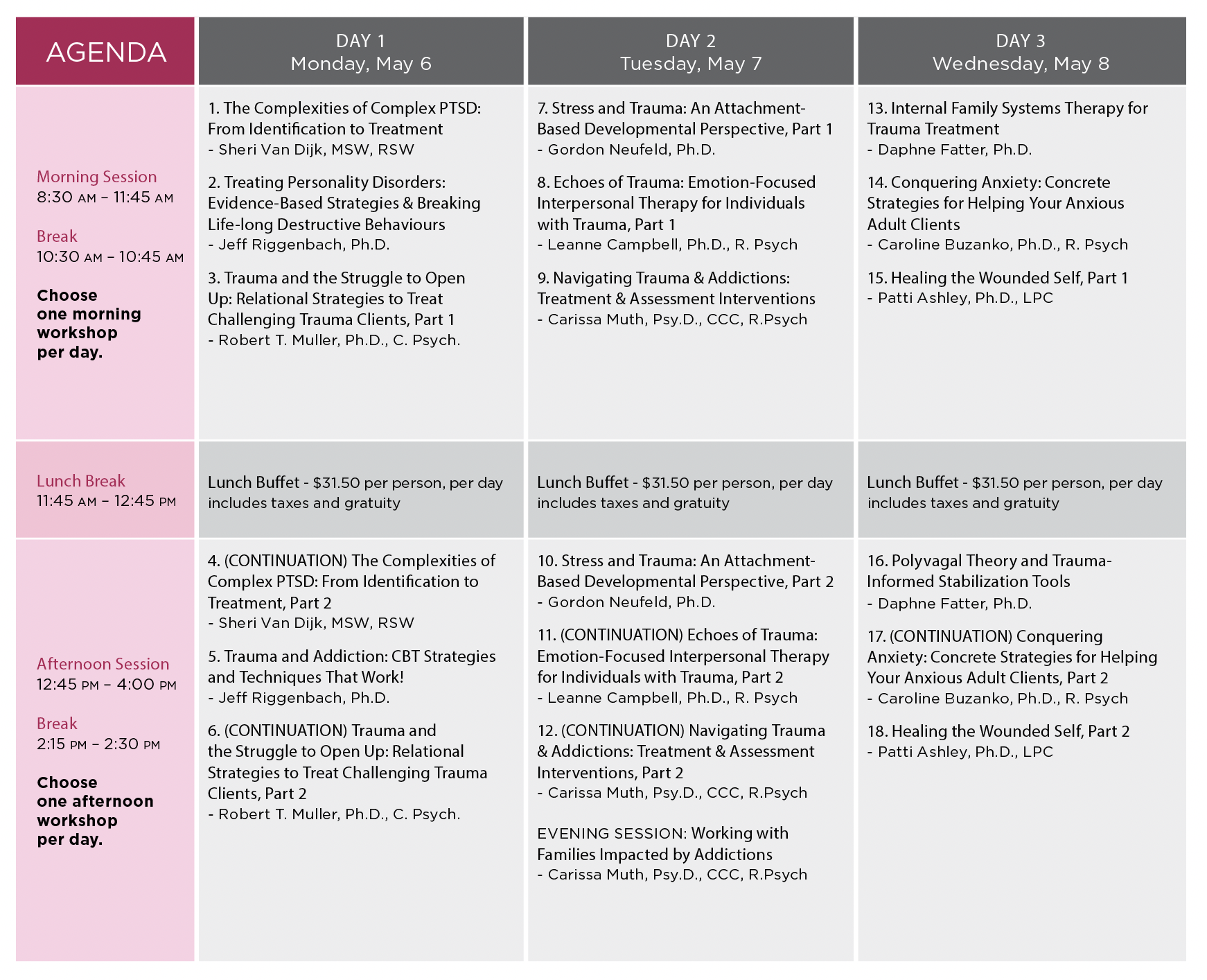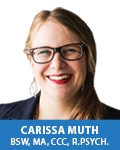 Important Notice:
Important Notice:
Online registration is now CLOSED for this conference. You can arrive up to one hour early to register at the door.
Presented by Sheri Van Dijk, MSW, RSW and Jeff Riggenbach, Ph.D. and Robert T. Muller, Ph.D., C. Psych. and Daphne Fatter, Ph.D. and Carissa Muth, Psy.D., CCC, R.Psych and Caroline Buzanko, Ph.D., R. Psych and Patti Ashley, Ph.D., LPC and Leanne Campbell, Ph.D., R. Psych and Gordon Neufeld, Ph.D.
Monday, May 6, 2024 – Wednesday, May 8, 2024 | Edmonton, ab
Online registration is now CLOSED for this conference. You can arrive up to one hour early to register at the door.
Monday, May 6, 2024 – Wednesday, May 8, 2024
8:30am – 4:00pm
DoubleTree by Hilton West Edmonton
16615 109th Ave NW, Edmonton, AB
phone: 780.484.0821
Registration on this page is for live in-person attendance only. To attend virtually please register here:https://webinars.jackhirose.com/product/the-western-canada-trauma-conference/
Live In-Person Conference
Please note, in-person registration does not include access to the live stream or recorded footage.
Live Stream from Home
Option Lunch Add-On
Price: $31.50 per day. Price includes tax and gratuity.
Menu:
Menu changes daily
Limited quantities available. Must pre-buy during registration, not available at the door. Individuals with strict dietary needs or preferences can pre-order lunch off the menu through hotel restaurant. Lunch buffets are non-refundable, no refund or credit will be granted under any circumstance.
Letter from Jack Hirose
Dear Colleagues,
The past few years have changed the landscape for how we learn and attend events. Zoom has been an invaluable tool for all of us, but the time has come to get back to the method that revitalizes the passion for our professions. Conferences allow for in-person benefits such as the chance to meet fellow clinicians and educators, exhibitors, on-site bookstore, group work and refreshments. We’ve removed the keynote but added even more presenters and a flexible format to create a custom learning experience of the highest calibre.
This year a total of 18 workshop sessions will be offered and will address a host of topics relevant to mental health, education, and any professional who applies behavioural science to practice. We invited 9 accomplished guest presenters who will share their knowledge and insights on a host of valuable mental health topics. Every session offered will focus on effective intervention strategies, recent advances and timely topics that will provide all professionals with the necessary knowledge and skills to better serve their clients.
Attendees have the option to attend either full-day or half-day sessions that will cover a diverse and broad range of important topics. For those who prefer to learn at home, we will be streaming portions of the conference online. The Western Canada Trauma Conference will be held in Edmonton, AB on May 6 – 8, 2024. Once again we are pleased to work closely and collaborate with our co-sponsors CTV, Sunshine Coast Health Centre and Georgia Straight Women’s Clinic. We hope to see you at our conference which promises to be another exceptional opportunity to not only enhance one’s knowledge and competencies but to network with our colleagues.
Sincerely,
Jack Hirose
CEO & President
Jack Hirose and Associates
Dear Fellow Conference Attendees,
On behalf of the entire team at Georgia Strait Women’s Clinic and Sunshine Coast Health Centre, we hope that you and your colleagues are able to join us for the Western Canada Trauma Conference scheduled May 6 to 8, 2024. Not only will this event coincide with our 20th anniversary of providing residential mental health and addictions treatment, it will also be held in my hometown of Edmonton! We cannot think of a better way to celebrate than to partner with Jack Hirose & Associates, Canada’s premier psychotherapy conference organizer.
An added bonus this Spring will be having one of our own, Clinical Director Dr. Carissa Muth, in Jack’s lineup. Carissa has an extensive background in occupational trauma and addictions based on her work in both Calgary and many years of experience at our residential mental health facility. Carissa is a gifted, engaging presenter so you will not want to miss her presentation on Day 2 of the Edmonton event!
We are happy to see that Jack will be offering both live and virtual training opportunities in 2024. We understand that today’s mental health professional needs the flexibility and convenience of virtual while still offering the opportunity to network with peers for those who can attend in person. Now, more than ever, we who work in mental health are being called upon to help our clients navigate a complex world, full of uncertainty and suffering. We look forward to seeing you in Edmonton or at one of the many other Jack Hirose & Associates events this coming Spring!
Melanie Jordan Alsager, MBA
Chief Executive Officer
Georgia Strait Women’s Clinic & Sunshine Coast Health Centre
![]()
Clinical Professionals: All mental health professionals including, but not limited to Clinical Counsellors, Psychologists, Psychotherapists, Social Workers, Nurses, Occupational Therapists, Hospice and Palliative Care Workers, Youth Workers, Mental Health Workers, Addiction Specialists, Marital & Family Therapists, Speech Language Pathologists, Vocational Rehabilitation Consultants, School Counsellors, Behaviour Specialists, Rehabilitation Consultants, Geriatric Specialists, and all professionals looking to enhance their therapeutic skills.

8:30am - 11:45am May 6, 2024
COURSE DESCRIPTION:
The term trauma is used to describe the challenging emotional consequences experienced by someone who has lived through a distressing event. But what happens when the trauma occurs early in life, and/or involves on-going or repetitive exposure to traumatic events? In these cases, individuals will often experience Complex Post-Traumatic Stress Disorder (C-PTSD), and/or dissociative disorders. As our understanding of trauma continues to evolve, so does our understanding of how to treat it. In this workshop, Sheri Van Dijk will define C-PTSD and introduce the Triphasic Model of treating complex trauma; and will then focus on Stage One of treating C-PTSD, involving skills to help stabilize clients using skills and strategies from several treatment modalities.
LEARNING OBJECTIVES:

Sheri Van Dijk, MSW, RSW, is a Social Worker who has been working with clients with severe mental health problems since 2000. With extensive experience in a hospital as well as community setting, Sheri now sees clients in private practice, and…
8:30am - 11:45am May 6, 2024
COURSE DESCRIPTION:
Individuals with personality disorders have long been considered the most challenging clients presenting in the clinical setting. Many patients lack motivation, most begin with poor insight, and some have such deeply engrained dysfunctional beliefs, unhealthy coping skills, and destructive behavioural patterns that continue to frustrate providers, family members, and consumers alike. Many professionals even continue to view them as untreatable.
However, there is hope. Emerging research suggests this is simply not the case. DBT, CBT, and Schema Therapy have paved the way in pioneering new attitudes and outcomes related to treating these conditions
Join leading exert in the field of personality dysfunction Dr. Jeff Riggenbach for this enjoyable training chock full of the latest research, techniques, and practical strategies. This powerful workshop will give you a new ability to help struggling individuals deal with issues related to self-injurious behaviours, multiple suicide attempts, frequently hurt feelings, intense and unpredictable mood swings, substance use, angry outbursts, toxic relationships and other problems that impair their ability to function in society. Leave this morning training session with an integrated DBT/CBT /Schema Informed approach to treating these cases and giving clients with even the most complex needs a life worth living.
LEARNING OBJECTIVES:

Jeff Riggenbach, Ph.D. is a best-selling and award winning author who has earned a reputation as an international expert in CBT and personality disorders. Over the past 20 years he has developed and overseen CBT-based treatment programs for Mood disorders,…
8:30am - 11:45pm May 6, 2024
COURSE DESCRIPTION:
This practical workshop, led by Dr. Robert T. Muller, author of psychotherapy bestseller: Trauma and the Avoidant Client, builds our understanding of the therapeutic relationship with challenging trauma clients.
As therapists, we try to maintain a strong therapeutic relationship, but this can be easier said than done. Drawing on attachment theory and research, and using a relational, integrative approach, Dr. Muller follows the ups and downs of the therapy relationship in trauma work. He points to choices therapists make in navigating the process, examining how they affect outcome
Specifically, we look at relationship patterns in trauma work, and how these can lead to troubling therapist-client enactments. When left unchecked, such patterns lead to ruptures in the relationship. In trauma work, how do we repair a ruptured alliance? And how can we help clients grow from the experience? This workshop looks at such issues in detail.
Theory is complemented by case examples and therapy segments. We draw from Dr. Muller’s new book, Trauma and the Struggle to Open Up, winner of the 2019 ISSTD award for the year’s best written work on trauma.
LEARNING OBJECTIVES:
AM AGENDA:
Opening Up About Trauma: A Relational Process
How to Pace the Process of Opening Up

Robert T. Muller, Ph.D., C.Psych. is on faculty as a Full Professor of Clinical Psychology at York University, is a Fellow of the International Society for the Study of Trauma & Dissociation (ISSTD); and both of his books have won…
12:45pm - 4:00pm May 6, 2024
COURSE DESCRIPTION:
Clients with a history of complex trauma are often mis-diagnosed, have an array of presenting problems (some of which may be life-threatening, such as suicidality, self-harm, and disordered eating behaviors), and a history of unsuccessful attempts at psychotherapy as well as medication trials. In this workshop, Sheri Van Dijk will discuss the phenomenon of dissociation as an explanation for many of these issues and will help deepen your understanding of this complex defence mechanism through the lens of the Theory of Structural Dissociation of the Personality. You’ll receive an introduction to Ego State Theory to help conceptualize your clients from this perspective, before learning some strategies to increase understanding of your client’s internal self-system, and skills to help clients understand and heal themselves.
LEARNING OBJECTIVES:
12:45pm - 4:00pm May 6, 2024
COURSE DESCRIPTION:
The relationship between trauma and addiction is well-established in the literature. This is no surprise, as clinicians know all too well that people with unresolved trauma and emotional wounds often turn to substances as a way to self-medicate; people with addictions may drive while impaired, gravitate towards toxic relationships, go to dangerous places to get their substance of choice or engage in many other behaviours that increase their risk of being traumatized.
The good news is, there is hope! Evidence shows increasing incidence of recovery for people struggling in the areas of trauma and addiction. While neuroscience has taught us much about this phenomenon in recent years, evidence-based CBT treatments, which to this day appear to still be at least as effective as many “newer” approaches, seem to have almost gotten lost in the shuffle.
Want to reground yourself in foundational clinical concepts for effectively treating this population?
This breakthrough workshop led by internationally recognized CBT expert Dr. Jeff Riggenbach will enhance your treatment approach, advance your clinical skills , and arm you with proven tools and techniques that you can implement with your clients the very next day in your practice. Participate in this 3 hour training and leave a more trauma-informed clinician with a practical, evidence-based approach that will equip your clients struggling with trauma and addiction to reclaim their lives and be well on their road to recovery.
LEARNING OBJECTIVES:
12:45pm - 4:00pm May 6, 2024
COURSE DESCRIPTION:
This practical workshop, led by Dr. Robert T. Muller, author of psychotherapy bestseller: Trauma and the Avoidant Client, builds our understanding of the therapeutic relationship with challenging trauma clients.
As therapists, we try to maintain a strong therapeutic relationship, but this can be easier said than done. Drawing on attachment theory and research, and using a relational, integrative approach, Dr. Muller follows the ups and downs of the therapy relationship in trauma work. He points to choices therapists make in navigating the process, examining how they affect outcome
Specifically, we look at relationship patterns in trauma work, and how these can lead to troubling therapist-client enactments. When left unchecked, such patterns lead to ruptures in the relationship. In trauma work, how do we repair a ruptured alliance? And how can we help clients grow from the experience? This workshop looks at such issues in detail.
Theory is complemented by case examples and therapy segments. We draw from Dr. Muller’s new book, Trauma and the Struggle to Open Up, winner of the 2019 ISSTD award for the year’s best written work on trauma.
LEARNING OBJECTIVES:
PM AGENDA:
Strategies to Bring a Sense of Safety to the Therapeutic Relationship
Navigating and Using Conflict in the Therapeutic Relationship
8:30am - 11:45am May 7, 2024
COURSE DESCRIPTION:
LEARNING OBJECTIVES:

Dr. Gordon Neufeld is a Vancouver-based developmental psychologist with over 50 years of experience with children and youth and those responsible for them. A foremost authority on child development, Dr. Neufeld is an international speaker, a bestselling author (Hold On To…
More information: www.neufeldinstitute.org
8:30am - 11:45am May 7, 2024
COURSE DESCRIPTION:
Emotionally Focused Therapy (EFT; S. Johnson) is best known as a potent couple intervention but has always, from its inception, been used in clinical practice with individuals. This workshop focuses on Emotionally Focused Individual Therapy (EFIT) as it applies to working with individuals struggling with the echoes of trauma. Attachment science and an Experiential Humanistic approach offer a map that simplifies how we view and frame clients’ problems, and how we intervene across the three-stage therapy process. The ‘experiential assessment’ tunes the therapist into clients’ strengths and vulnerabilities to chart clients’ therapeutic journey toward a felt sense of security with self and others – the pathway to symptom resolution and the antidote to trauma.
You’ll discover:
LEARNING OBJECTIVES:

Dr. Leanne Campbell is co-director of the Vancouver Island Centre for EFT (Emotionally Focused Therapy) and Campbell & Fairweather Psychology Group. Trained by Dr. Sue Johnson in the early 1990s, she has continued to work in the EFT model since…
8:30am - 11:45am May 7, 2024
COURSE DESCRIPTION:
In this workshop, you will be provided with tools to understand the complexity involved in the development of substance use disorder when co-morbid with a trauma related diagnosis. Attendees will leave the workshop equipped with practical techniques for treating those struggling with addictions and comorbid trauma including basics of assessments, working with families, and providing post-treatment care. Additionally, various intervention methods will be overviewed including CBT and narrative therapy in order to provide the client with techniques to implement with a variety of client presentations.

Dr. Carissa Muth is a registered psychologist in Alberta and British Columbia and the Clinical Director at the Sunshine Coast Health Centre and Georgia Strait Women’s Clinic. She holds Doctorate of Psychology, Master of Arts in Counselling, and Bachelor of…
12:45pm - 4:00pm May 7, 2024
COURSE DESCRIPTION:
LEARNING OBJECTIVES:
LEARNING OBJECTIVES:
12:45pm - 4:00pm May 7, 2024
COURSE DESCRIPTION:
Emotionally Focused Therapy (EFT; S. Johnson) is best known as a potent couple intervention but has always, from its inception, been used in clinical practice with individuals. This workshop focuses on Emotionally Focused Individual Therapy (EFIT) as it applies to working with individuals struggling with the echoes of trauma. Attachment science and an Experiential Humanistic approach offer a map that simplifies how we view and frame clients’ problems, and how we intervene across the three-stage therapy process. The ‘experiential assessment’ tunes the therapist into clients’ strengths and vulnerabilities to chart clients’ therapeutic journey toward a felt sense of security with self and others – the pathway to symptom resolution and the antidote to trauma.
You’ll discover:
LEARNING OBJECTIVES:
12:45pm - 4:00pm May 7, 2024
COURSE DESCRIPTION:
In this workshop, you will be provided with tools to understand the complexity involved in the development of substance use disorder when co-morbid with a trauma related diagnosis. Attendees will leave the workshop equipped with practical techniques for treating those struggling with addictions and comorbid trauma including basics of assessments, working with families, and providing post-treatment care. Additionally, various invention methods will be overviewed including CBT and narrative therapy in order to provide the client with techniques to implement with a variety of client presentations.
6:30pm - 8:30pm May 7, 2024
COURSE DESCRIPTION:
Addictions is not simply a disorder of an individual but a disorder of a system. Both in its development and its impact, addictions alter those around it. Most often, family members of those with the addiction are collateral damages in the addiction journey. In surviving the process, family members can develop unhealthy habits, such as sacrificing their time, assets, or health to ensure the safety of their loved one with the addiction. Family members can also be left desperate, lost, and fatigued. In this workshop, participants will learn how to navigate working with families supporting a loved one with an addiction, including addressing problematic behavioural patterns and providing a more effective strategy for families to use. Participants will also leave with answers to commonly asked questions, such as should I give up alcohol if my loved one is struggling with an alcohol addiction? And what do I do if my loved one relapses?
LEARNING OBJECTIVES:
8:30am - 11:45pm May 8, 2024
COURSE DESCRIPTION:
Developed by Richard Schwartz, Ph.D. forty years ago, Internal Family Systems (IFS) is becoming one of the fastest growing therapy models. The evidenced-based approach is non-pathologizing and attends to the complex impact of traumatic stress, making it effective for working with PTSD and Complex Trauma. Dr. Fatter will review the basic model of IFS, including theoretical assumptions, goals for treatment, and steps of using the IFS model. Dr. Fatter will apply an IFS framework common clinical presentations including how to conceptualize PTSD. This presentation will include case examples to describe the process of applying IFS to trauma treatment in individual therapy with adults. Dr. Fatter will guide an experiential exercise to demonstrate the model and invite clinicians to have increased awareness of their own parts. This presentation will also include ways IFS can be used to help clinicians cope with countertransference reactions and vicarious trauma that often occurs among clinicians when providing trauma treatment. Applications of IFS to legacy and cultural burdens, traumas that are passed down intergenerationally from parents, caregivers, and ancestors as well as burdens from collective trauma and dominant culture, will also be discussed.
LEARNING OBJECTIVES:

Daphne Fatter, Ph.D. is a licensed psychologist, international speaker and consultant in private practice in Dallas, Texas. Having trained under the direct supervision of Dr. Bessel van der Kolk, MD., international pioneer in research on traumatic stress, Dr. Fatter is…
8:30am - 11:45am May 8, 2024
COURSE DESCRIPTION:
Think you’ve mastered everything you need to know about anxiety management? Think again – you might be surprised!
When it comes to treating anxiety, even the most experienced professionals can unknowingly perpetuate ineffective methods. For instance, are you relying on reducing anxious feelings to gauge the success of your interventions? Do you use fear hierarchies? Do you advocate deep breathing or relaxation techniques as anxiety-busting strategies? If so, you may be unknowingly contributing to your clients’ cycle of anxiety.
If you’re committed to elevating your understanding of emotional health and improving outcomes for anxious clients, this workshop is indispensable. It is essential to revolutionize your approach to anxiety and emotional well-being. Go beyond the surface to explore the intricacies of anxiety and emotion regulation. Seamlessly blending the latest research with practical techniques, this workshop equips you with actionable insights that can be applied to real-world cases immediately.
Why Attend?
LEARNING OBJECTIVES:
Understanding Anxiety from a Transdiagnostic Lens
Responding to Anxiety to Break its Cycle
Promoting client buy-in to optimize clinical outcomes
Emotional Awareness & Essential Core Skills (#1 & 2) for Anxiety Matery

Caroline Buzanko, Ph.D., R. Psych, is a psychologist. Mother. Professor. International Speaker. Yoda of Anxiety. ADHD Superhero. And Changer of Lives. With nearly three decades of experience, she is a recognized expert in resilience and the social, emotional, and behavioural well-being…
8:30am - 11:45am May 8, 2024
COURSE DESCRIPTION:
Treating trauma in clinical practice is an integral part of effective treatment outcomes. Sometimes clinicians feel stuck and unable to recognize what is keeping a client from moving forward. Often underneath trauma lies a sense of shame or self-loathing. According to trauma experts such as Peter Levin, Bessel van der Kolk, and Gabor Mate’ trauma isn’t something that happens to you, it is what happens inside you.
Challenging trauma clients often harbor feelings of not being good-enough, a deep fear of judgement, and have difficulty being vulnerable in treatment and other relationships. These feelings usually begin with poor attachment and early childhood influences, which then lead to an inability to self-regulate and/or find emotional safety throughout life.
Trauma changes the brain and nervous system resulting in depression, anxiety, fear, shame, rage, addiction, eating disorders, relationship difficulties, and other clinical problems. So much of what trauma clients experience hides in the subconscious until excavated and transformed into post-traumatic growth.
Dr. Patti Ashley combines decades of evidenced based work, neuroscience, polyvagal theory, attachment research, and various treatment modalities to help clients break free from trauma and find ways to access emotional safety and authenticity.
This 3 hour training will provide clinicians with a deeper understanding of the impact of explicit trauma and the correlating implicit shame in clinical practice. Tools and techniques for effective treatment including person-centered empathy, rescripting, right-brain psychotherapy, creative arts, mindfulness, self-compassion, and much more will be explored.
LEARNING OBJECTIVES:

International workshop presenter, author, and psychotherapist Patti Ashley, Ph.D, LPC, has integrated 40 years of experience in special education, child development, and psychology into her wholehearted work as a psychotherapist, author, international speaker, and authenticity architect coach. She brings unique insights into the identification…
More information: www.pattiashley.com
12:45pm - 4:00pm May 8, 2024
COURSE DESCRIPTION:
Polyvagal Theory has become a common go-to resource in trauma treatment. However, clinicians often have difficulty understanding what Polyvagal Theory is and how to incorporate it into effective trauma treatment. Dr. Fatter will discuss Polyvagal Theory in the context of treating PTSD and complex trauma, including how it fits in to a traditional three phase model for trauma recovery. As such, the importance of creating a treatment plan around arousal regulation will be examined. Dr. Fatter will explain in detail symptoms of hyper-arousal, hypo-arousal and calm states of the autonomic nervous system based on Polyvagal Theory. This will help clinicians better identify signs of what state clients are in and help clinicians be able to educate clients about their nervous system. Specific trauma-informed stabilization tools will be discussed that support Polyvagal Theory. There will be opportunities for participants to experience and practice these tools themselves. This presentation will be interactive and experiential!
LEARNING OBJECTIVES:
12:45pm - 4:00pm May 8, 2024
COURSE DESCRIPTION:
Think you’ve mastered everything you need to know about anxiety management? Think again – you might be surprised!
When it comes to treating anxiety, even the most experienced professionals can unknowingly perpetuate ineffective methods. For instance, are you relying on reducing anxious feelings to gauge the success of your interventions? Do you use fear hierarchies? Do you advocate deep breathing or relaxation techniques as anxiety-busting strategies? If so, you may be unknowingly contributing to your clients’ cycle of anxiety.
If you’re committed to elevating your understanding of emotional health and improving outcomes for anxious clients, this workshop is indispensable. It is essential to revolutionize your approach to anxiety and emotional well-being. Go beyond the surface to explore the intricacies of anxiety and emotion regulation. Seamlessly blending the latest research with practical techniques, this workshop equips you with actionable insights that can be applied to real-world cases immediately.
Why Attend?
LEARNING OBJECTIVES:
Strategies to Distance and Enhance
Emotional Behaviours & Essential Core Skills (#3 & 4) for Anxiety Mastery
12:45pm - 4:00pm May 8, 2024
COURSE DESCRIPTION:
Treating trauma in clinical practice is an integral part of effective treatment outcomes. Sometimes clinicians feel stuck and unable to recognize what is keeping a client from moving forward. Often underneath trauma lies a sense of shame or self-loathing. According to trauma experts such as Peter Levin, Bessel van der Kolk, and Gabor Mate’ trauma isn’t something that happens to you, it is what happens inside you.
Challenging trauma clients often harbor feelings of not being good-enough, a deep fear of judgement, and have difficulty being vulnerable in treatment and other relationships. These feelings usually begin with poor attachment and early childhood influences, which then lead to an inability to self-regulate and/or find emotional safety throughout life.
Trauma changes the brain and nervous system resulting in depression, anxiety, fear, shame, rage, addiction, eating disorders, relationship difficulties, and other clinical problems. So much of what trauma clients experience hides in the subconscious until excavated and transformed into post-traumatic growth.
Dr. Patti Ashley combines decades of evidenced based work, neuroscience, polyvagal theory, attachment research, and various treatment modalities to help clients break free from trauma and find ways to access emotional safety and authenticity.
This one-day training will provide clinicians with a deeper understanding of the impact of explicit trauma and the correlating implicit shame in clinical practice. Tools and techniques for effective treatment including person-centered empathy, rescripting, right-brain psychotherapy, creative arts, mindfulness, self-compassion, and much more will be explored.
LEARNING OBJECTIVES:
| Registration | Super Early Bird Fee | Early Bird Fee | Regular Fee |
|---|---|---|---|
| Individual 1 Day Enrollment | -- | $289.00 | $309.00 |
| Individual 2 Day Enrollment | -- | $489.00 | $509.00 |
| Individual 3 Day Enrollment | -- | $699.00 | $719.00 |
| Group 3-7 | -- | $659.00 | $679.00 |
| Group 8-14 | -- | $639.00 | $659.00 |
| Group 15+ | -- | $619.00 | $639.00 |
| Full-Time Student | -- | $619.00 | $639.00 |
All fees are per person and in Canadian Dollars ($CAD)
Fees do not include applicable taxes (5% GST).
Early bird cutoff date: April 22, 2024
The early bird date has passed. Regular rates apply.
Please review our Registration Terms and Conditions for information on our cancellation policy, payment policies, rebates, and more. You must agree to our Terms and Conditions to register for a workshop or conference.
All brochures and forms are provided in .PDF format.
If you are unable to open our files, we recommend downloading Adobe Reader for free.
16615 109th Ave NW, Edmonton, AB
phone: 780.484.0821
Our rates:
To make a reservation over the phone, please call 780.484.0821 or 1.800.661.9804
Delux 2 Queen: $169.00 per night plus tax
1 King Suite: $194.00 per night plus tax
*please note, room reservations are subject to availability*
Please keep in mind when booking Jack Hirose and Associates corporate guest rooms, reservations booked for most hotels can be cancelled within 48 hours . If you are booking guest rooms through third party websites in many instances the reservations booked cannot not be cancelled.
Jack Hirose & Associates is approved by the Canadian Psychological Association to offer continuing education for psychologists. Jack Hirose & Associates maintains responsibility for the program.
† The Alberta College of Social Workers (ACSW) and the Newfoundland and Labrador Association of Social Workers (NLASW) accept CPA-approved CEUs.
* Participants will receive a certificate of completion after every workshop. Workshops are pre-approved for 5.5 or 6 credits per day unless otherwise specified.
Please check back closer to the conference date for more information.
There are no related events at this time.